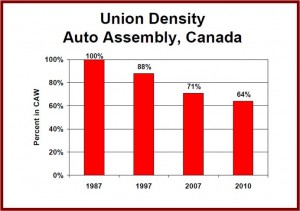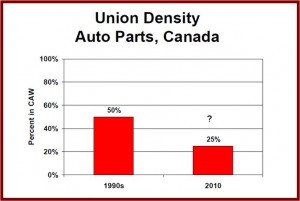
Lewenza said that in most major auto-producing nations – China, Germany, Brazil and notably not the U.S. – a national auto policy lays the foundation for the sector’s ongoing prosperity, and avoid a “race-to-the-bottom” on working conditions. (Not unlike the contract race he just partially lost.) CAW is going to re-double its effort to win the active support of the federal government on this issue.
CAW members at Chrysler have approved a new collective bargaining agreement by voting 90% for ratification, the Canadian union announced late yesterday. The number of Chrysler members actually casting ballots was not disclosed after ratification meetings held over the weekend in Windsor, Brampton and Etobicoke, Ontario. Chrysler was the last company to settle and it was the most vocal about what it thought were excessive demands.
It was the end of a difficult series of negotiations for the weakened union, as the three multinational automakers – Chrysler, Ford and GM – presented a united front at the opening of bargaining and asked for the end of all defined benefit pensions, cuts in current wages, which range from C$34-$41, dropping the “30 years and out” retirement provision, as well as elimination of most work rules. The Detroit Three argued that an overvalued Canadian dollar, unhealthy financial markets, and increasing imports from Asia and Europe – ironically some from Chrysler, Ford and GM, required the drastic givebacks. If not more production would be moved out of Canada. When the deal was finally done, a partial victory emerged for both sides. This was arguably the best the union could do against job-exporting automakers without bringing the factories tumbling down on its own organized members.

The grim reality for CAW workers: The chart shows the decline in union membership as non-union Japanese transplants grow and the Detroit Three continue to shrink.
The biggest loss for the union, which makes one of six vehicles in North America, continues to be the contentious two-tier wages that are now in place at Chrysler Canada. These were first established in 2009 under its reorganization as part of the deal to receive Canadian and U.S. taxpayer funding to survive bankruptcy. The so-called “grow in” period for new hires to reach full wages from the 60% they start at now increased from six years to ten years this time around – the same as at Ford and GM in Canada. In return, the union protected existing members as best it could at the expense of new hires.
The UAW in the U.S. accepted two tier wages in its previous 2007 contract, and there remains no grow-in provision in the contracts negotiated last September. Second tier workers can only reach roughly 70% of the wages of older workers, and they will not get a defined benefit pension plan, veteran workers retain. This makes Canadian auto workers – who split from the UAW in 1984-85 – the most expensive in the world. At least that is by the calculation of the Detroit Three, who are apparently overlooking what German metal workers are paid to assemble vehicles in the export-oriented industry, and the fact that wages are now roughly only 5% of the cost of a car.
The Chrysler agreement includes a C$3,000 ratification bonus for current workers as well as cost of living lump sum payments of $2,000 in each of 2013, 2014 and 2015. It offers protection of current pension benefits for existing workers, but not new ones, as well as some job commitments in all locations.
The contract with Chrysler follows the pattern deal set with Ford on 17 September and the agreement reached with General Motors on 20 September. Ford and GM workers ratified the new four-year contract by margins of 82% and 73%, respectively. The CAW represents 21,000 workers at the Detroit Three auto companies, including its 8,000 Chrysler workers.
Chrysler ratification votes by classification:
- Production – 90%
- Skilled Trades – 93%
- Office & Security – 98%
CAW President Ken Lewenza said the union would now shift toward winning a long-overdue national auto policy for Canada.
“One of our objectives coming into these talks was to position our industry for future growth and success, and we did as much as we possibly could on that front,” Lewenza said. “But without a comprehensive sector development strategy, the future of auto manufacturing in Canada remains uncertain, at best.”
Lewenza said that, like in most major auto-producing nations have a national auto policy (China, Germany, Brazil and notably not the U.S.) that lays the foundation for the sector’s ongoing competitiveness and prosperity, and avoids a “race-to-the-bottom” on working conditions. (Not unlike the contract race he just partially lost) He said the union is going to re-double its effort to win the active support of the federal government on this issue.

It’s not just unionization of final assembly workers that is declining. This CAW 2007 projection turned out to be wrong, though, since it entered a no-strike agreement with Magna, by far the largest auto business in Canada. CAW currently represents 30,000 parts workers, about half of all component parts jobs.
The CAW’s Re-Think Canada’s Auto Industry campaign proposals include the development of a transparent and consistent auto investment policy, building a green industry, a buy-Canadian vehicle purchasing strategy, a re-think on automotive trade policy, negotiating Canadian manufacturing footprint commitments, in addition to a number of other measures.
The Conservative Harper government has been pushing for a new Canada-EU free trade deal that the CAW claims would undermine the rights of federal, provincial and municipal governments to manage public spending over goods and services. It would also increase the importation of automobiles. The CAW political prospects in fighting the free trade deal are unknown, but appear to this observer to be weak.
The CAW represents 21,000 workers at the Detroit Three auto companies, including its 8,000 Chrysler workers.
See:

